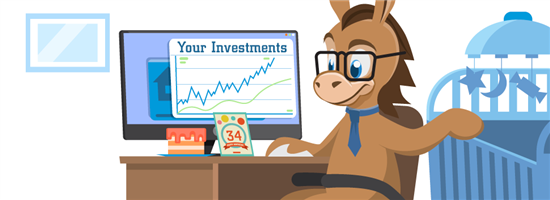How to Invest in Your 30s
Investing in your 30s is all about balancing financial priorities. Your decisions now will affect your future. Learn how to build long-term wealth in your 30s.
 |
| © CreditDonkey |
Your 30s can be a wonderful, but complicated era.
On one hand, you're earning more. But on the other hand, you may have new financial demands like saving for a house and starting a family. Retirement may seem far away, but it's crucial to start planning for it now.
How can you balance current needs and investing for the future?
In this guide, learn smart investing tips to build wealth in your 30s. Learn how to prioritize your financial goals and best investments in your 30s.
Why Start Investing in Your 30s
Investing as early as possible will give you the best chances of reaching your retirement goals. But if you're just starting in your 30s, it's still not too late. You still have plenty of time to grow your money.
If you start investing at 30 years old, if you invest $5,200 per year, and assuming an 8% return rate, you will have $1 million by retirement at age 65.
But if you start investing at age 40, you will need to invest $12,600 per year to reach the same amount by retirement age. That's a major difference.
How much should you be saving in your 30s:
Here's a chart that shows how much you will need to invest at every age to reach $1 million by age 65 (assuming 8% annual return).
| Age | How much to invest annually |
|---|---|
| 30 | $5,200 |
| 32 | $6,150 |
| 34 | $7,400 |
| 36 | $8,750 |
| 38 | $10,500 |
| 40 | $12,600 |
| 45 | $20,300 |
| 50 | $35,000 |
This is why it's important to start ASAP, even if you're only investing small amounts.
Saving for retirement should be your top priority in your 30s. After retirement, you still have to support yourself for another 20-30 years. So don't put it off any longer.
How to Build Wealth in Your 30s
 |
| © CreditDonkey |
Between your current life goals and long-term plans, it can be hard to know what to work on first.
Here's what we recommend to prioritize in your 30s. You'll also learn what types of accounts to invest money in first.
1. Contribute to Your Employer 401(k)
Make contributing to your company 401(k) your biggest focus. This is the easiest way to obtain financial security for retirement. Don't put this off any longer.
When you enroll in a 401(k) plan, a portion of your salary is taken out even before the paycheck reaches your hands. You don't see it and so won't even miss it. That money gets invested and will grow.
And what's even better - most companies offer an employer match. That's free money they're giving you toward your retirement, so take advantage of it. Try to contribute at least to the maximum match amount.
- $40,000 yearly salary (pre-tax)
- 3% annual salary increase
- 5% contribution
- 5% company match
This above example shows how you can reach almost $1 million by retirement even on a lower income.
The maximum 401(k) contribution is $19,500 per year. As you get raises and move up in your career, you can increase your contributions until you eventually max it out.
2. Save for Retirement in a Roth IRA
Now, what if your company doesn't offer a 401(k) or you work for yourself?
The next best option to save for retirement is in a Roth IRA account. An IRA is an Individual Retirement Account that you can open at brokerages.
With a Roth IRA, your contributions are made with after-tax dollars. While you can't claim a tax deduction, it does have two perks over Traditional IRAs:
- After age 59½, all withdrawals are tax-free. You also don't pay any taxes on investment gains.
- You can withdraw contributions at any time with no penalty. This means you can withdraw funds if you really need to (like if you need to take money out for a down payment).
IRAs have an annual contribution limit. For 2020, the maximum you can invest in an IRA is $6,000. If you don't have a company 401(k), then make sure you contribute the maximum amount. If you start at age 30, you can still reach $1 million by retirement.
Even if you have a 401(k) plan, it's still in your best interest to put whatever you can into an IRA account too. This is your future you're talking about, after all.
3. Pay off Bad Debt
Maybe you made some credit card mistakes in your 20s. Or even took out a personal loan to help with some stuff. These kinds of debts are considered bad debt.
If you have high-interest debt - anything over 8% APR - make paying them off your top goal (after 401(k)/IRA savings). This reason is because the interest charges far outweigh any returns on investments you might earn.
Getting rid of debt first will free up more money to invest and save for your other big goals.
4. Have an Emergency Fund
Do you have enough to protect yourself and your family if an emergency happens?
It's important to have funds set aside to cover emergencies like car or home repairs, medical bills, and loss of a job. The last thing you want is to rack up more credit card debt or dip into retirement savings.
Most financial experts recommend that you have enough in your savings account to cover three to six months of living expenses. After you have socked away at least 3 months' worth, then you can start on other goals.
Online banks usually offer the highest savings rate, so your money can grow more.
It's better to paying off high-interest debt first because the interest rate is higher than what you can earn from investments. However, if you don't have emergency savings, then make that a priority as well. Split between paying off debt and building an emergency fund at the same time.
5. Plan for Life Events
The 30s is usually when we start to make big life changes. At this stage, you're probably planning for things like marriage, kids, and buying a house. How should these goals fit into your overall financial plan?
If you still have extra money in the budget after contributing to retirement accounts, debt payments, and emergency savings, then put it toward your other goals.
Of course, it may not make sense to wait until you're completely debt-free to pursue these goals. You may not want to delay your life plans. In that case, carefully balance your priorities so you work toward a little of everything at once.
6. Save Excess in a Brokerage Account
Still have excess cash even after all the previous steps? That's great! There are many different ways you can invest these extra funds, depending on your needs.
- Regular Taxable Brokerage Account: This is a general investment account. You have the flexibility to withdraw funds at any time.
- 529 College Savings: Get an early start on saving for your children's college tuition. Investment earnings grow tax-free.
- Health Savings Account (HSA): If you have a high-deductible health insurance, this account helps you save for healthcare costs. Contributions are tax deductible.
Investment Strategies for 30-Year-Olds
| © CreditDonkey |
Now that you know how to nail down priorities, let's go over your best investment options. Here's the approach we recommend for investing in your 30s.
Risk in Your 30s
The good news is that as a 30-something investor, you're still young enough to afford a greater deal of risk.
You still have a long time horizon to retirement, so you have time to ride out the volatility of the stock market. This means you can take on a more aggressive investment strategy.
Your portfolio can contain a higher percentage of stocks, which has the potential for higher growth. For 30-somethings, your asset allocation could be anywhere between 70% and 90% stocks.
As you grow older, gradually make adjustments to reduce the percentage of stocks and increase bonds.
Best Investments for 30 Somethings
You may be wondering… what should I be investing in?
The trick is to diversify your investments. That way, if one stock isn't doing well, you have others to carry you through. Here are some good investments in your 30s to easily build diversification.
Stocks
Pick stocks you can buy and hold for the long term. It's recommended to have 15-20 stocks for diversification. Invest in companies in different industries and asset groups.
ETFs
Exchange traded funds are a basket containing hundreds of stocks. This way, you get instant exposure to a wide range of stocks with one investment. They are professionally managed by investment professionals.
Index funds
Index funds follow a specific market index. For example, you can buy into an S&P 500 index fund, which invests in the 500 largest U.S. companies.
Target date funds
This is a type of mutual fund designed for a specific retirement date. For example, if you're 35 now, you can invest in a 2050 target date fund. The investment strategy will be more aggressive to start and become more conservative as you get closer to retirement.
Real estate
Can't afford your own investment property? Real estate investing platforms like Fundrise and DiversyFund make it possible for you to invest even with as little as $10 - $500. Investing in real estate is a great way to diversify assets and hedge against the stock market.
Should You Get a Financial Advisor?
If you're really serious about getting your financial life in order in your 30s, it could be a good idea to seek professional advice. Financial advisors provide guidance to help you make the best money choices.
Here are some situations where you may benefit from their services:
- If you're having trouble getting started, a financial advisor can help put together a custom personal finance plan based on your current situation, goals, and risk tolerance.
- If you're going through a major life change (like getting married or having a child), it could be a good idea to sit down with a coach for a one-time financial planning session.
- If you don't know how to invest, look into a robo-advisor to handle portfolio management for you.
Final Tips for Financial Success in Your 30s
Avoid lifestyle creep
As people earn more, they're also tempted to spend more too. If you get a raise, invest it instead. Contribute more to your 401(k) or open an additional investment account.
Consider life insurance
This is especially important if you have dependents. In the event of an accident and something happening to you, are your spouse and children covered? A life insurance policy can provide financial security to your family.
Monitor your credit
Your credit score is critical. A low score makes it a lot harder for you to qualify for a loan (which affects being able to get a mortgage). If your score is low, work on improving your credit.
What the Experts Say
Investing can be daunting, but you don't have to go it alone. As part of our series on investing, CreditDonkey asked a panel of experts to answer readers' most pressing questions.
Here's what they said:
Bottom Line
Getting started is the most important step to investing. Even if you didn't invest in your 20s, you still have a long timeline to build a nest egg for your later years in life.
In your 30s, prioritize retirement investments by maximizing your 401(k) and Roth IRA contributions. Pay off debt and make sure you and your family are protected in cases of emergencies. After you have built this solid foundation, start planning for things like buying a home or your dream vacations.
Write to Anna G at feedback@creditdonkey.com. Follow us on Twitter and Facebook for our latest posts.
Note: This website is made possible through financial relationships with some of the products and services mentioned on this site. We may receive compensation if you shop through links in our content. You do not have to use our links, but you help support CreditDonkey if you do.
Fundrise, LLC ("Fundrise") compensates CreditDonkey Inc for new leads. CreditDonkey Inc is not an investment client of Fundrise.
Empower Personal Wealth, LLC (“EPW”) compensates CREDITDONKEY INC for new leads. CREDITDONKEY INC is not an investment client of Personal Capital Advisors Corporation or Empower Advisory Group, LLC.
Read Next:



